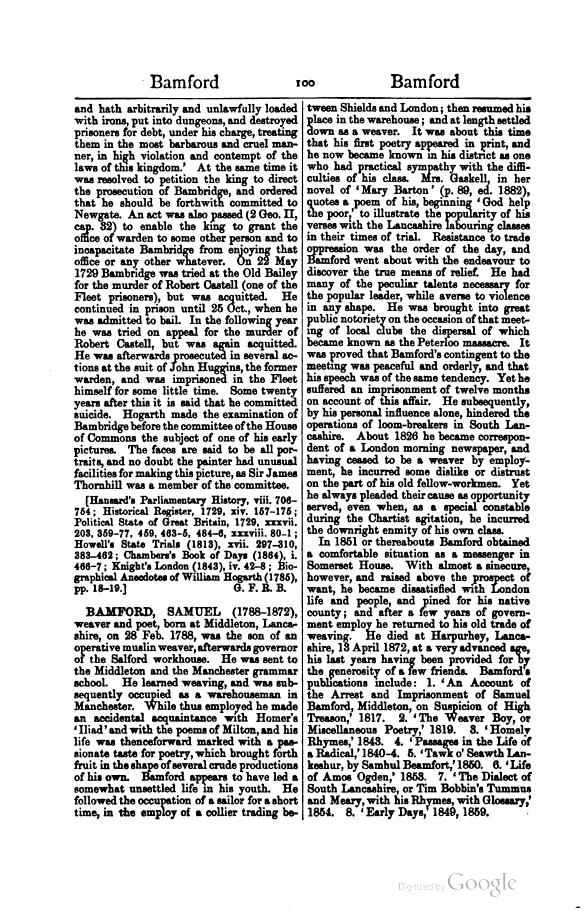and hath arbitrarily and unlawfully loaded with irons, put into dungeons, and destroyed prisoners for debt, under his charge, treating them in the most barbarous and cruel manner, in high violation and contempt of the laws of this kingdom,' At the same time it was resolved to petition the king to direct the prosecution of Bambridge, and ordered that he should be forthwith committed to Newgate. An act was also passed (2 Geo. II, cap. 32) to enable the king to grant the office of warden to some other person and to incapacitate Bambridge from enjoying that office or any other whatever. On 22 May 1729 Bambridge was tried at the Old Bailey for the murder of Robert Castell (one of the Fleet prisoners), but was acquitted. He continued in prison until 25 Oct., when he was admitted to bail. In the following year he was tried on appeal for the murder of Robert Castell, but was again acquitted. He was afterwards prosecuted in several actions at the suit of John Huggins, the former warden, and was imprisoned in the Fleet himself for some little time. Some twenty years after this it is said that he committed suicide. Hogarth made the examination of Bambridge before the committee of the House of Commons the subject of one of his early pictures. The faces are said to be all portraits, and no doubt the painter had unusual facilities for making this picture, as Sir James Thornhill was a member of the committee.
[Hansard's Parliamentary History, viii. 706-764; Historical Register, 1729, xiv. 157-175; Political State of Great Britain, 1729, xxxvii. 203, 359-77, 459, 463-5, 484-6, xxxviii. 80-1; Howells State Trials (1813), xvii. 297-310, 383-462; Chambers's Book of Days (1864), i. 466-7; Knight's London (1843), iv. 42-8; Biographical Anecdotes of William Hogarth (1785), pp. 18-19.]
BAMFORD, SAMUEL (1788–1872), weaver and poet, born at Middleton, Lancashire, on 28 Feb. 1788, was the son of an operative muslin weaver, afterwards governor of the Salford workhouse. He was sent to the Middleton and the Manchester grammar school. He learned weaving, and was subsequently occupied as a warehouseman in Manchester. While thus employed he made an accidental acquaintance with Homer's ‘Iliad’ and with the poems of Milton, and his life was thenceforward marked with a passionate taste for poetry, which brought forth fruit in the shape of several crude productions of his own. Bamford appears to have led a somewhat unsettled life in his youth. He followed the occupation of a sailor for a short time, in the employ of a collier trading between Shields and London; then resumed his place in the warehouse; and at length settled down as a weaver. It was about this time that his first poetry appeared in print, and he now became known in his district as one who had practical sympathy with the difficulties of his class. Mrs. Gaskell, in her novel of ‘Mary Barton’ (p. 89, ed. 1882), quotes a poem of his, beginning 'God help the poor,' to illustrate the popularity of his verses with the Lancashire labouring classes in their times of trial. Resistance to trade oppression was the order of the day, and Bamford went about with the endeavour to discover the true means of relief. He had many of the peculiar talents necessary for the popular leader, while averse to violence in any shape. He was brought into great public notoriety on the occasion of that meeting of local clubs the dispersal of which became known as the Peterloo massacre. It was proved that Bamford's contingent to the meeting was peaceful and orderly, and that his speech was of the same tendency. Yet he suffered an imprisonment of twelve months on account of this affair. He subsequently, by his personal influence alone, hindered the operations of loom-breakers in South Lancashire. About 1826 he became correspondent of a London morning newspaper, and having ceased to be a weaver by employment, he incurred some dislike or distrust on the part of his old fellow-workmen. Yet he always pleaded their cause as opportunity served, even when, as a special constable during the Chartist agitation, he incurred the downright enmity of his own class.
In 1851 or thereabouts Bamford obtained a comfortable situation as a messenger in Somerset House. With almost a sinecure, however, and raised above the prospect of want, he became dissatisfied with London life and people, and pined for his native county; and after a few years of government employ he returned to his old trade of weaving. He died at Harpurhey, Lancashire, 13 April 1872, at a very advanced age, his last years having been provided for by the generosity of a few friends. Bamford's publications include:
- ‘An Account of the Arrest and Imprisonment of Samuel Bamford, Middleton, on Suspicion of High Treason,’ 1817.
- ‘The Weaver Boy, or Miscellaneous Poetry,’ 1819.
- ‘Homely Rhymes,’ 1843.
- ‘Passages in the Life of a Radical,’ 1840-4.
- ‘Tawk o'Seawth Lankeshur, by Samhul Beamfort,’ 1850.
- ‘Life of Amos Ogden,’ 1858.
- ‘The Dialect of South Lancashire, or Tim Bobbin's Tummus and Meary, with his Rhymes, with Glossary,’ 1854.
- ‘Early Days,’ 1849, 1859.

